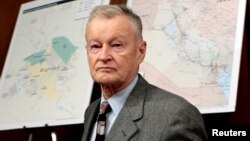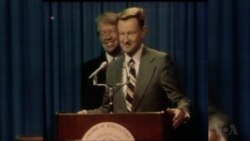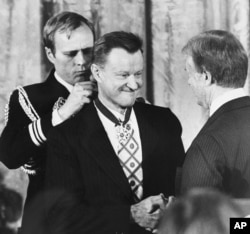A funeral for Zbigniew Brzezinski, the national security adviser to President Jimmy Carter and a noted foreign policy expert and thinker, will be held Friday at St. Matthew's Roman Catholic Cathedral in Washington, D.C.
Brzezinski died May 26 in Virginia. He was 86.
In a statement, Carter called Brzezinski “a superb public servant” as well as “brilliant, dedicated and loyal.” Along with Henry Kissinger, Brzezinski helped shape U.S. foreign policy with a lasting impact, while also serving as an adviser to Presidents Lyndon Johnson and John F. Kennedy.
Watch: Zbigniew Brzezinski's Helped Craft Foreign Policy for Decades
One of his most well-known accomplishments came in 1978, when Brzezinski helped President Carter reach an agreement between Israeli Prime Minister Menachem Begin and Egyptian President Anwar Sadat to secure the Camp David peace accords between the two countries.
He also was involved in making other major U.S. foreign policy decisions during the Carter administration, including negotiating the Panama Canal Treaty, arming mujahedin in Afghanistan to fight the Soviet invaders and planning a failed mission to rescue 52 American hostages held in Iran.
Wisdom appreciated
Alexander Vershbow, a former deputy secretary general of NATO and former U.S. ambassador to Russia, told VOA Brzezinski's wisdom also guided U.S. and NATO policy in the post-Cold War period.
“On one hand, listening to the appeals of countries like Poland, like Czechoslovakia, like Hungary, to become part of the Western family, which they were denied 70 years ago ... but also reaching out to Russia, and trying to help Russia become an integral part of the European family, the common European house, as [former Soviet leader Mikhail] Gorbachev described it,” Vershbow said.
John Hopkins professor
Following his work in the White House, Brzezinski continued to be an influential voice on foreign policy matters. He served as a counselor and trustee at the Center for Strategic and International Studies and a professor at Johns Hopkins University.
Brzezinski went on to ruffle the feathers of Washington's power elite with his 1983 book, "Power and Principle," which was hailed and reviled as a kiss-and-tell memoir.
“I have never believed in flattery or lying as a way of making it,” he told The Washington Post that year. “I have made it on my own terms.”
This story originated in VOA's Russian Service.







